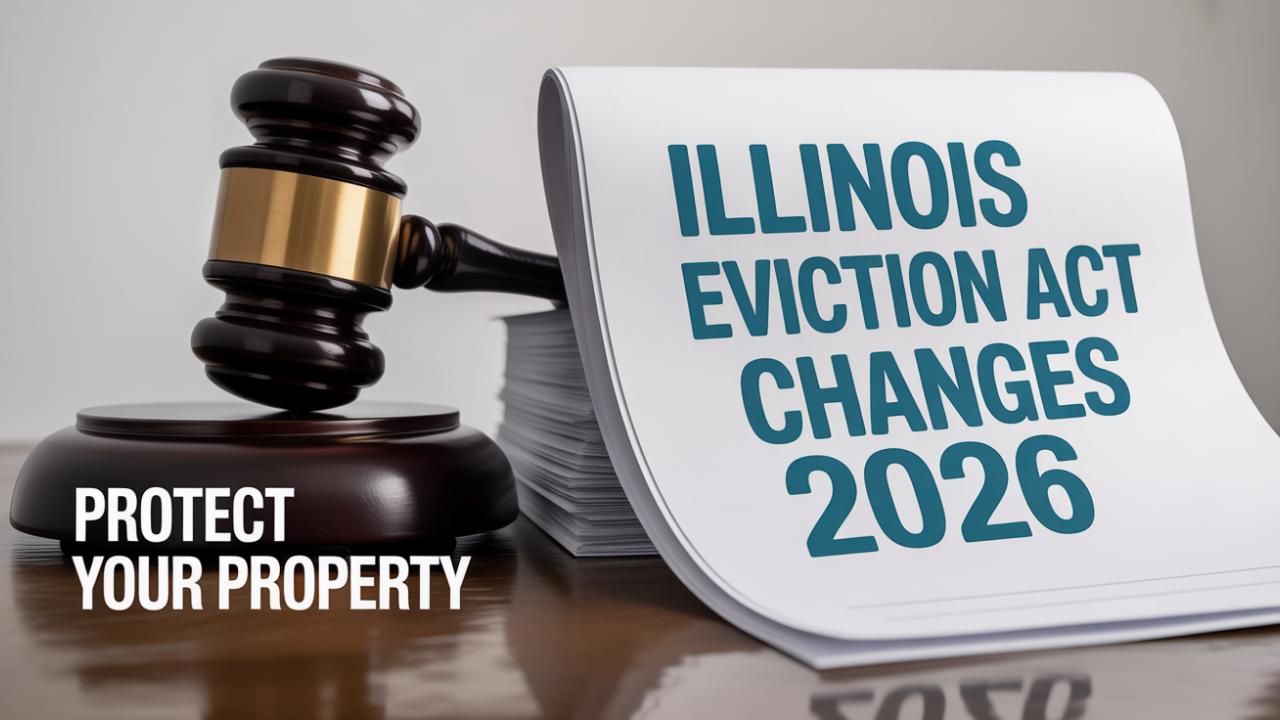
Author: Mark Ainely | Partner GC Realty & Development & Co-Host Straight Up Chicago Investor Podcast
My name is Mark Ainley. I’m a Chicago property manager, real estate investor, and co-host of the Straight Up Chicago Investor Podcast. Every week, I talk to landlords across the city and suburbs who are trying to stay compliant, protect their investments, and do right by their residents, all while navigating a growing maze of housing laws.
One of the more important updates for Illinois landlords in 2026 involves changes to the Illinois Eviction Act. Starting January 1, 2026, landlords can no longer list minors as defendants in eviction filings. That might sound like a small adjustment, but the impact is huge, especially for anyone managing rental housing in Cook County or Chicago.
If you’re a Chicago landlord, rental owner, or property manager, here’s what you need to know, and how to stay compliant while keeping your operations efficient.
Why the Illinois Eviction Act Amendment Matters
Let’s start with why this change exists.
Imagine a single mother in Chicago falls behind on rent after losing her job. The landlord serves a five-day notice and later files an eviction case listing her name, and her teenage son’s name, because he’s an occupant. Years later, that same boy applies for his first apartment. The new landlord runs a background check and sees his name tied to an eviction case he had nothing to do with.
That mark can follow him for years, making it harder to rent or get a loan.
Lawmakers recognized that this wasn’t fair. When the state reviewed eviction data, they found that families were disproportionately impacted after eviction moratoriums ended. The result was House Bill 3566, a law designed to protect children from being collateral damage in disputes between adults.
For landlords, this means more responsibility, but also more clarity. In the end I don't really disagree with this change for once. I would hate to see kids get punished for their parents' affairs.
What House Bill 3566 Changes
The 2026 amendment to the Illinois Eviction Act (House Bill 3566) makes it explicitly illegal to name minors as defendants in eviction lawsuits.
If a landlord files a case listing a child’s name, the court will dismiss and seal the record. “Sealed” means that the case is hidden from public databases, preventing it from appearing on background checks or rental screenings.
But it doesn’t stop there, if a landlord intentionally or maliciously lists a minor, the law allows for actual damages, attorney’s fees, and statutory penalties. The state wants to ensure landlords can’t use eviction filings to intimidate tenants or families.
The takeaway is clear: evictions are legal actions between adults, not children.
How to Adjust Your Leasing and Eviction Procedures
When you hear this, it’s easy to think, “Okay, just don’t list minors.” But as a property manager, I can tell you, this kind of change impacts several layers of your process.
Here’s what landlords should be doing to stay compliant and avoid costly re-filings or delays:
1. Differentiate Tenants from Occupants
Your lease should clearly separate leaseholders (the adults who sign and are responsible for rent) from authorized occupants (such as children). If you’re still using a boilerplate lease, update it now to reflect that distinction.
2. Collect Dates of Birth for Everyone in the Unit
This might sound tedious, but it’s important. When you know who’s under 18 and who isn’t, you can update records at renewal time. When someone turns 18, that’s when they need to be added as a leaseholder.
We’ve seen landlords get into trouble simply because they didn’t track birthdays or update lease files over time.
3. Double-Check Every Notice
When serving a five-day or ten-day notice, make sure it’s addressed only to adult leaseholders. If you’re unsure who lives in the unit, you can use “and unknown occupants,” but never list minors by name. Many old templates don’t account for this, review your forms with an attorney or management professional.
4. Prepare for Possible Re-Filings
If a case is dismissed because a minor was listed, you’ll need to refile, pay new court fees, and lose valuable time. Build that risk into your process or budget, especially if you self-manage.
5. Communicate Clearly with Tenants
Transparency is your best friend. Let tenants know you’ll never list their kids in any legal filing. Explain the process, offer rental assistance resources, and do everything possible to resolve the issue before going to court.
Illinois’ court-based rental assistance program can often help cover rent arrears, future rent, and even court costs. A few extra conversations can save everyone the headache.
Connecting the Dots: How This Fits Into Chicago Landlord Laws
This isn’t an isolated update. It’s part of a broader shift toward tenant protections in Illinois.
If you manage property in Chicago or Cook County, you’re already dealing with a lineup of regulations, the Residential Landlord and Tenant Ordinance (RLTO), the Cook County RTLO, and the Just Housing Amendment, just to name a few.
Each of these comes with specific notice rules, penalties, and fairness requirements. For example:
Under the RTLO, accepting partial payment after serving a notice might invalidate your eviction.
The Retaliation Act prevents you from pursuing eviction out of revenge.
And now, under the 2026 amendment, naming a minor means instant dismissal and possible penalties.
When you’re managing multiple units, it’s not easy to keep track of it all, and that’s why having systems and professionals who live in this space daily can make all the difference.
Real-World Experience: How GC Realty & Development Handles It
At GC Realty, we’ve managed thousands of rentals across Chicagoland, from single-family homes to multi-unit buildings. We’ve seen every possible scenario, and our approach has always been to get ahead of problems before they become court cases.
Here’s what that looks like in practice:
1. Early Intervention
We don’t wait until rent is two months behind to reach out. Our property managers contact tenants early, offer reminders, and connect them with resources like rental assistance. Most people want to pay their rent, they just need a little flexibility or communication.
2. Solid Documentation
We document everything: payments, notices, and communication. When we do have to file, the process moves faster and cleaner because we’ve followed every rule and never list minors as defendants.
3. Full Compliance
Our team is trained on RLTO, RTLO, Fair Housing, and now the new Eviction Act amendment. Our leases are up to date, our notices are compliant, and our landlords don’t have to lose sleep wondering if they missed a rule buried in fine print.
4. Screening the Right Way
Evictions often trace back to poor screening. Our tenant placement process digs deep, verifying income, reviewing rental history, and checking credit while staying compliant with Fair Housing and Just Housing laws. We never discriminate against families with children; we focus on financial responsibility and stability.
5. Accurate Rent Pricing
Setting the right rent can make or break your tenant quality. Through our Free Rent Analysis, we compare your property to current market trends across Chicago neighborhoods. Underpricing leaves money on the table; overpricing attracts desperation. Finding that balance is key to long-term stability.
Lessons Learned from Chicago Evictions
One thing I’ve learned after years of managing properties in Chicago: most evictions are preventable.
They usually start with a small issue, unclear expectations, miscommunication, or a financial hardship that spirals. Once an eviction hits court, everyone loses time and money.
That’s why laws like this one, while they may seem like a burden, actually push landlords toward better systems and communication. The more proactive and organized you are, the less these changes will disrupt your business.
Q&A
Q: Why were minors even listed in eviction cases before?
In the past, some attorneys listed every occupant, thinking it protected the landlord by covering anyone with possession rights. The problem is, that included kids who never signed the lease. This law fixes that by keeping evictions focused on adults responsible for rent.
Q: What should I do when an occupant turns 18?
Easy, update your lease. If an occupant turns 18 during the lease term, add them as a leaseholder when renewing. That ensures they’re legally bound to the contract and can be named if necessary. Keep birthdays in your tenant files so you don’t miss that transition.
Q: What happens if I accidentally list a minor?
The court will dismiss and seal the case. That means you’ll start over, new filing, new fees, new court date. If the court believes you did it intentionally, you could face penalties or attorney’s fees. Always double-check names before submitting.
Q: Does this apply to adult roommates or adult children?
No, the law is specific to minors. If someone’s 18 or older, they should be on the lease. You can include them in notices or filings as needed.
Q: How does this tie into Fair Housing laws?
Familial status, meaning families with children, is a protected class. You can’t deny housing or set policies that negatively impact families. This amendment reinforces that. It protects children from being punished for situations outside their control.
Q: Why not just manage this myself?
You can, but Illinois housing law is complex and constantly changing. A property manager like GC Realty & Development handles everything, from compliant leases to rent collection, so you can focus on your investment instead of learning legal updates the hard way.
The Bigger Picture: A Smarter Way to Manage in 2026
Every new rule can feel like another hurdle for landlords. But the truth is, each one gives us an opportunity to professionalize how we manage rentals in Illinois.
By clearly defining who’s responsible, documenting communication, and staying proactive, you can reduce your risk, and improve the experience for your residents.
At GC Realty & Development, we’ve learned that the best way to avoid evictions and protect your investment is through strong screening, clear expectations, and responsive management. It all starts before the lease is ever signed.
Don’t Want To Go At This Alone?
We’ve shared a lot of information here on investing in real estate locally in Chicagoland. If you live outside the area, it may seem overwhelming for those wanting to invest in the Chicago market. But we really just look at it as a team sport.
Who’s on your investing team? Do you even have a team? GC Realty & Development, LLC has a dedicated team of professionals willing to share decades of experience in all facets of real estate investment. We handle everything from brokerage, leasing, and property management. Whether you hire us or not, we’re happy to provide our resources and expertise.
What gets me up in the morning and keeps me going 12 hours a day is the ability to add value to local area investors in Chicago and beyond! Those who connect with me often hear me say that our goal is to bring value to everyone we come in contact with.
We hope that in return, they will one day hire us for our tenant placement or property management services, refer us to someone they know, or leave a review about our services. We would clearly love all three; however, we’re happy whenever we get the opportunity to help!
Reach out today!

 Vendor Portal
Vendor Portal



